2019届一轮复习人教版必修三Unit 1 Festivals around the world单元教案(14页word版)
- 格式:doc
- 大小:126.90 KB
- 文档页数:14

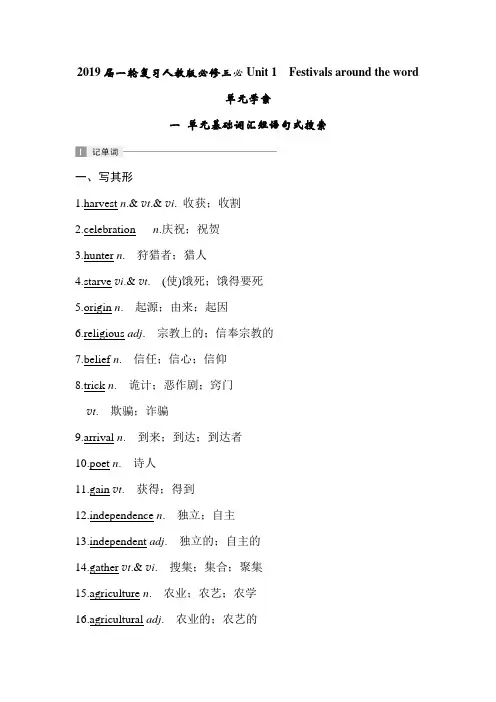
2019届一轮复习人教版必修三必Unit 1Festivals around the word单元学案一单元基础词汇短语句式搜索一、写其形1.harvest n.& v t.& v i. 收获;收割2.celebration n.庆祝;祝贺3.hunter n. 狩猎者;猎人4.starve v i.& v t. (使)饿死;饿得要死5.origin n. 起源;由来;起因6.religious adj. 宗教上的;信奉宗教的7.belief n. 信任;信心;信仰8.trick n. 诡计;恶作剧;窍门v t. 欺骗;诈骗9.arrival n. 到来;到达;到达者10.poet n. 诗人11.gain v t. 获得;得到12.independence n. 独立;自主13.independent adj. 独立的;自主的14.gather v t.& v i. 搜集;集合;聚集15.agriculture n. 农业;农艺;农学16.agricultural adj. 农业的;农艺的17.award n. 奖;奖品v t. 授予;判定18.admire v t. 赞美;钦佩;羡慕19.energetic adj. 充满活力的;精力充沛的;积极的20.clothing n. 衣服21.custom n. 习惯;风俗22.worldwide adj. 遍及全世界的;世界性的23.fool n. 愚人;白痴;受骗者v t. 愚弄;欺骗v i. 干傻事;开玩笑adj. 傻的24.apologize v i. 道歉;辩白25.drown v t.& v i. 淹没;溺死;淹死26.sadness n. 悲哀;悲伤27.obvious adj. 明显的;显而易见的28.wipe v t. 擦;揩;擦去29.remind v t. 提醒;使想起30.forgive v t. (forgave,forgiven)原谅;饶恕二、知其意1.beauty n. 美;美人2.ancestor n. 祖先;祖宗3.Mexico n. 墨西哥4.feast n. 节日;盛宴5.bone n. 骨;骨头6.Easter n. (耶稣)复活节7.Christian n. 基督徒;信徒adj. 基督教的;信基督教的8.prediction n. 预言;预报;预告9.fashion n. 样子;方式;时尚10.parking n. (汽车等)停放11.weep v i. (wept/wept/,wept)哭泣;流泪n. 哭;哭泣12.announcer n. 广播员;告知者;报幕员1.take__place 发生2.in__memory__of 纪念;追念3.dress__up 穿上盛装;打扮;装饰4.play__a__trick__on 搞恶作剧;诈骗;开玩笑5.look__forward__to 期望;期待;盼望6.day__and__night 日夜;昼夜;整天7.as__though 好像8.have__fun__with 玩得开心9.parking__lot 停车场10.turn__up 出现;到场11.keep__one’s__word 守信用;履行诺言12.hold__one’s__breath 屏息;屏气13.set__off 出发;动身;使爆炸14.remind...of... 使……想起……1.Some festivals are held to honour the dead or to satisfy the ancestors,who might return either__to__help__or__to__do__harm.有些节日是为了纪念死者,或者使祖先得到满足,因为祖先们有可能回到世上(给人们)提供帮助,也有可能带来危害。
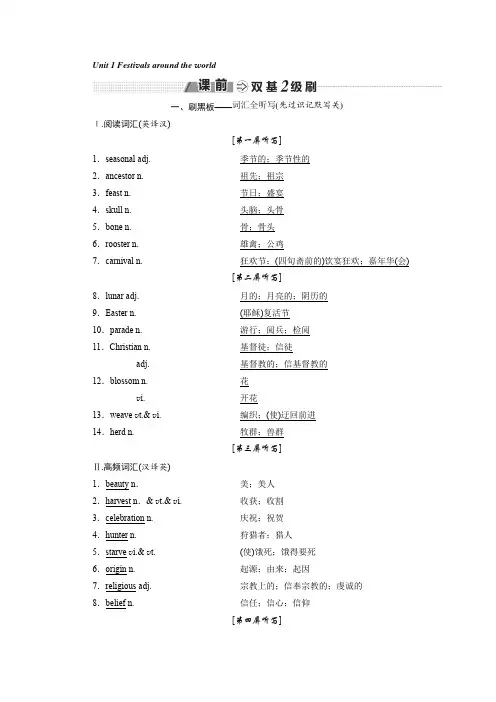
Unit 1 Festi v als around the w orld一、刷黑板——词汇全听写(先过识记默写关)Ⅰ.阅读词汇(英译汉)[第一屏听写]1.seasonal adj.季节的;季节性的2.ancestor n. 祖先;祖宗3.feast n. 节日;盛宴4.skull n. 头脑;头骨5.bone n. 骨;骨头6.rooster n. 雄禽;公鸡7.carnival n. 狂欢节;(四旬斋前的)饮宴狂欢;嘉年华(会)[第二屏听写]8.lunar adj.月的;月亮的;阴历的9.Easter n. (耶稣)复活节10.parade n. 游行;阅兵;检阅11.Christian n. 基督徒;信徒adj.基督教的;信基督教的12.blossom n. 花v i.开花13.weave v t.& v i.编织;(使)迂回前进14.herd n. 牧群;兽群[第三屏听写]Ⅱ.高频词汇(汉译英)1.beauty n.美;美人2.harvest n.& v t.& v i.收获;收割3.celebration n. 庆祝;祝贺4.hunter n. 狩猎者;猎人5.starve v i.& v t.(使)饿死;饿得要死6.origin n. 起源;由来;起因7.religious adj.宗教上的;信奉宗教的;虔诚的8.belief n. 信任;信心;信仰[第四屏听写]9.trick n.诡计;恶作剧;窍门v t.欺骗;诈骗10.poet n. 诗人11.arrival n. 到来;到达;到达者12.gain v t.获得;得到13.independence n. 独立;自主14.independent adj.独立的;自主的15.gather v t.& v i.搜集;集合;聚集16.agriculture n. 农业;农艺;农学[第五屏听写]17.agricultural adj.农业的;农艺的18.award n. 奖;奖品v t.授予;判定19.admire v t.赞美;钦佩;羡慕20.energetic adj.充满活力的;精力充沛的;积极的21.clothing n. 衣服22.custom n. 习惯;风俗23.worldwide adj.遍及全世界的;世界性的[第五屏听写]24.fool n.愚人;白痴;受骗者v t.愚弄;欺骗v i.干傻事;开玩笑adj.傻的25.permission n. 许可;允许26.parking n. (汽车等)停放27.apologize v i.道歉;辩白28.drown v t.&v i.淹没;溺死;淹死29.sadness n. 悲哀;悲伤[第七屏听写]30.obvious adj.明显的;显而易见的31.wipe v t.擦;揩;擦去32.weep v i.哭泣;流泪n. 哭;哭泣33.remind v t.提醒;使想起34.forgive v t.原谅;饶恕35.take_place 发生36.in_memory_of 纪念;追念37.dress_up 穿上盛装;打扮;装饰38.play_a_trick_on 搞恶作剧;诈骗;开玩笑[第八屏听写]39.look_forward_to期望;期待;盼望40.day_and_night 日夜;昼夜;整天41.as_though 好像42.have_fun_with 玩得开心43.parking_lot 停车场44.turn_up 出现;到场45.keep_one's_word 守信用;履行诺言46.hold_one's_breath 屏息;屏气47.set_off 出发;动身;使爆炸48.remind_..._of_... 使……想起……二、刷清单——热身自盘点(再过基本应用关) (一)核心单词(三)经典句式(四)初中考点再回顾一、过重点单词——纵引横联超人一点1.trick n.诡计;恶作剧;窍门v t.欺骗;诈骗[教材原句] If the neighbours do not give any sweets, the children might play a trick on them.如果邻居们什么糖也不给,那么孩子们就可以捉弄他们了。
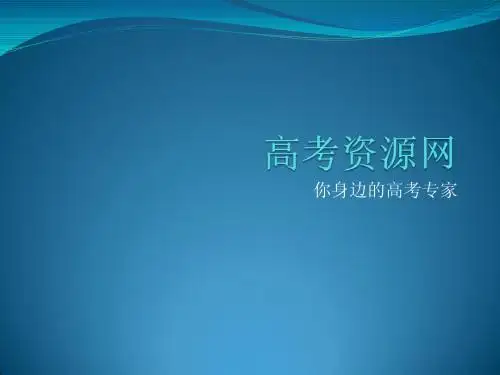
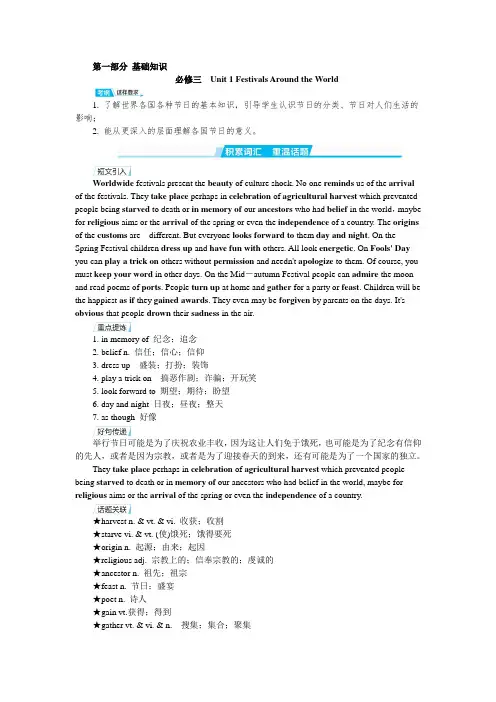
第一部分基础知识必修三Unit 1 Festivals Around the World1. 了解世界各国各种节日的基本知识,引导学生认识节日的分类、节日对人们生活的影响;2. 能从更深入的层面理解各国节日的意义。
Worldwide festivals present the beauty of culture shock. No one reminds us of the arrivalof the festivals. They take place perhaps in celebration of agricultural harvest which prevented people being starved to death or in memory of our ancestors who had belief in the world,maybe for religious aims or the arrival of the spring or even the independence of a country. The origins of the customs are different. But everyone looks forward to them day and night. On the Spring Festival children dress up and have fun with others. All look energetic. On Fools' Day you can play a trick on others without permission and needn't apologize to them. Of course, you must keep your word in other days. On the Mid-autumn Festival people can admire the moon and read poems of ports. People turn up at home and gather for a party or feast. Children will be the happiest as if they gained awards. They even may be forgiven by parents on the days. It's obvious that people drown their sadness in the air.1. in memory of 纪念;追念2. belief n. 信任;信心;信仰3. dress up 盛装;打扮;装饰4. play a trick on 搞恶作剧;诈骗;开玩笑5. look forward to 期望;期待;盼望6. day and night 日夜;昼夜;整天7. as though 好像举行节日可能是为了庆祝农业丰收,因为这让人们免于饿死,也可能是为了纪念有信仰的先人,或者是因为宗教,或者是为了迎接春天的到来,还有可能是为了一个国家的独立。
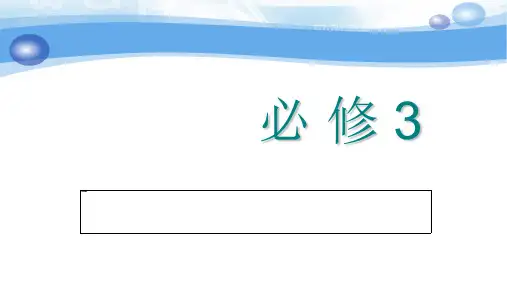
Unit 1 Festivals around the world听第1段材料,回答第1、2题。
1.What's the topic of the conversation?A.MidAutumn Day.B.The Spring Festival.C.The Dragon Boat Festival.答案:A2.When was the festival first celebrated in Chinese history?A.In the Tang Dynasty.B.In the Ming Dynasty.C.In the Qing Dynasty.答案:A听第2段材料,回答第3至5题。
3.What does the man miss most about Christmas?A.His family.B.Colored lights.C.Christmas music.答案:A4.What is the woman's brother doing now?A.Taking photos.B.Doing some shopping.C.Being with his family.答案:B5.What can we learn about the speakers?A.The man comes from China.B.The man bought the woman a camera.C.The woman's brother loves taking photos.答案:C【技巧点拨】有时候听力材料中并不直接说出答案,比如第5题,选项C中的taking photos与听力材料中a good camera相呼应,此时需格外留意。
Text 1W:Tomorrow is the MidAutumn Day. Why is the festival called “MidAutumn Day”?M:Because the 15th of the eighth lunar month is just in the middle of autumn.W:Oh? What activities do you have this evening?M:Family members have a delicious dinner, eat mooncakes and enjoy the beautiful moon.W:How fun!M:It's said the moon on this evening is the loveliest, the roundest, the brightest and the most charming.W:Really? When was the festival first celebrated?M:It was first celebrated in the Tang Dynasty. At that time, a lot of poets wrote many beautiful poems about the moon.W:I see.Text 2W:Christmas used to be my favorite time of the year. But right now I feel terrible.M:No wonder. It's your first Christmas away from home. And so is mine.W:What do you miss most about Christmas in America?M:I miss lots of things—the Christmas music, the colored lights, the parties. But most of all, I miss my family.W:Me, too. There's nothing better than being with family at Christmas time.M:At least your brother is here with you.W:I'm really glad about it.M:Where is he? I thought he was coming over.W:He said he needed to do a little shopping first.M:I hope he'll like the gift we've bought for him.W:I'm sure he'll love it. He always wants a good camera. And in Beijing there are lots of interesting things to photograph.1.核心单词(1)religious (adj.) 宗教上的;信奉宗教的;虔诚的→religion (n.) 宗教;宗教信仰(2)belief (n.) 信任;信心;信仰→believe (vt.) 相信(3)trick (n.) 诡计;恶作剧;窍门 (vt.) 欺骗;诈骗(4)gain (vt.) 获得;得到 (n.) 好处;利益;收益(5)gather (vt. & vi.) 搜集;集合;聚集→gathering (n.) 聚集;聚会;集会(6)award (n.) 奖;奖品 (vt.) 授予;判定(7)admire (vt.) 赞美;钦佩;羡慕→admiration (n.) 钦佩;羡慕(8)permission (n.) 许可;允许→permit (vt.) 允许(9)apologize (vi.) 道歉;辩白→apology (n.) 道歉(10)obvious (adj.) 明显的;显而易见的(11)remind (vt.) 提醒;使想起→reminder (n.) 引起回忆的事物2.阅读单词(1)harvest (n. & vt. & vi.) 收获;收割(2)agriculture (n.) 农业;农艺;农学agricultural (adj.) 农业的;农艺的(3)energetic (adj.) 充满活力的;精力充沛的;积极的(4)custom (n.) 习惯;风俗(5)worldwide (adj.) 遍及全世界的;世界性的(6)fool (n.) 愚人;白痴;受骗者 (vt.) 愚弄;欺骗 (vi.) 干傻事;开玩笑 (adj.) 傻的(7)drown (vt. & vi.) (声音)淹没;(使)溺毙;(使)淹死(8)sadness (n.) 悲哀;悲伤(9)wipe (vt.) 擦;揩;擦去(10)weep (vi.) (wept, wept) 哭泣;流泪 (n.) 哭;哭泣(11)forgive (vt.) (forgave, forgiven) 原谅;饶恕【即景活用】用括号内所给单词的适当形式填空1.Kazuo Ishiguro from the United Kingdom ________(award) Nobel Prize in Literature in 2017.答案:was awarded2.Some volunteers hold the ________(believe) that they will be the heroes of human beings if they succeed.答案:belief3.________(obvious), he's sorry for being late. He looks so sad.答案:Obviously4.India attained ________(independent) in 1947 after a long struggle.答案:independence5.You mustn't use the car without my ________(permit).答案:permission6.At dawn they ________(gather) up all their picnic things and set off for home.答案:gathered7.There are still lots of people suffering from ________(starve) and disease.答案:starvation8.It is a worldwide custom that the ________ (energy) young are admired for their youth, vitality and creativity.答案:energetic9.Don't wait for an ________(apologize). Many times the person who hurt youdoes not intend to apologize.答案:apology10.Anyone who knows his exact time of ________(arrive) keeps it a secret.答案:arrival联想积累1.后缀(i)ous形容词大全①religious 宗教上的②humorous 幽默的③dangerous 危险的④glorious 光荣的⑤cautious 小心的⑥ambitious 有抱负的⑦various 各种各样的⑧envious 嫉妒的⑨courageous 勇敢的⑩famous 著名的⑪generous 慷慨的;大方的⑫mountainous 多山的⑬poisonous 有毒的2.“相信”与“不相信”高频单词聚焦①belief n. 信任;信心;信仰②faith n. 信任;信念;信仰③trust n.& vt. 信任④convince vt. 使确信;使信服⑤doubt n.& vt. 怀疑⑥suspect vi.& vt. 怀疑;猜想n. 犯罪嫌疑人3.“服装”大全①clothing (总称)衣服②boot 靴子③glove 手套④jeans 牛仔裤⑤scarf 围巾⑥short trousers 短裤⑦skirt 裙子⑧sock 袜子;短袜⑨suit 套装;一套衣服⑩sweater 毛衣⑪tie 领带⑫uniform 制服1.take_place 发生;举行2.in_memory_of 纪念;追念3.dress_up 穿上盛装;打扮;装饰4.play_a_trick_on 搞恶作剧;诈骗;开玩笑5.look_forward_to 期望;期待;盼望6.day_and_night 日夜;昼夜;整天7.as_though 好像8.have fun with 玩得开心9.turn up 出现;到场10.keep one's word 守信用;履行诺言11.hold one's breath 屏息;屏气12.set off 出发;动身;使爆炸13.remind ... of ... 使……想起……【即景活用】用所给短语的适当形式填空keep one's word, take place, turn up, set off, in memory of, look forwardto答案:set off2.This ceremony was held ________the people killed in the plane crash last month.答案:in memory of3.We're ________seeing the new policy carried out, which has drawn many people's attention.答案:looking forward to4.He had promised to attend my birthday party, but he didn't ________ .答案:turn up5.Great changes ________recently in this mountainous area in the past few years.答案:have taken place6.Once you have promised to do something, you should ________ .答案:keep your word联想积累1.“play+n.”构成的短语①play a trick on搞恶作剧;诈骗;开玩笑②play a joke on开……的玩笑;捉弄③play an important role/part in在……中起着重要作用④play the role of扮演……的角色2.look短语大全①look around环顾四周②look after照料;看管③look at看④look back on/upon/to回顾⑤look down upon/on轻视⑥look into往……看;调查⑦look out当心,小心⑧look through透过……看;检查;浏览⑨look up抬头看;(在词典里)查找⑩look up to赞赏;尊敬⑪look forward to 期望;期待;盼望3.含介词to的常用动词短语①look forward to 期望;期待;盼望②lead to 导致③contribute to 促成;造成④get down to 开始做……⑤be devoted to 专心于⑥be/get used/accustomed to 习惯于⑦adjust/adapt to 适应⑧object to/be opposed to 反对4.breath相关短语扫描①hold one's breath 屏住呼吸②lose one's breath 喘不过气来③take a deep breath 做深呼吸④out of breath 上气不接下气⑤catch one's breath 喘口气1.Some festivals are held to honour the dead or to satisfy the ancestors, who might return either to help or to do harm.有些节日,是为了纪念死者,或者使祖先得到满足,因为祖先们有可能回到世上(给人们)提供帮助,也有可能带来危害。
Unit 1 Section ⅠⅠ.单句语法填空1.Jim lives near a highway,so he hears the traffic noise day and night.解析:考查固定短语。
句意:Jim住在公路附近,所以他整日整夜听到交通噪声。
表示“整日整夜”要用day and night。
2.He had hardly reached here when it began to rain.解析:考查时间状语从句。
句意:他一到这儿,天就开始下起雨来。
句子中使用了hardly…when…结构,意思是“一……就……”。
3.Her unhappy childhood was the origin(original) of her problems later in life.解析:考查名词。
句意:她不幸的童年是她以后生活中问题的起因。
空前有定冠词the,故要用名词形式。
4.The workers started working with the machine running(run).解析:考查with的复合结构。
句意:机器开动了,工人们开始工作了。
分析句子结构可知,machine与run之间为逻辑上的主动关系,故用动词ing形式。
5.To Kim's surprise,his birthday cake was in the shape of a lovely train.解析:考查介词。
句意:让Kim吃惊的是,他的生日蛋糕是一个可爱的火车的形状。
in the shape of呈……的形状。
6.I had_finished(finish) reading the novel by nine o'clock last night.解析:考查过去完成时。
句意:到昨天晚上九点钟我已经读完了这本小说。
表示在过去某一时间或动作之前已经发生或完成了的动作或状语,要用过去完成时。
2019届一轮复习人教版必修三Unit 1 Festivals around the world单元教案Teaching goals1. To help students learn to talk about festivals2. To help students learn to read festivals and celebrations.3. To help students learn to make phone calls, invitations and express “thanks”4. To help students learn to use some important words and expressions5. To help students identify examples of “The modal verbs” in the textTopicFestivals; how festivals began; how festivals are celebratedVocabularybeauty, harvest, celebration, starve, origin, religious, ancestor, Mexico, feast, bone, belief, trick, poet, arrival, gain, independence, independent, gather, agriculture, agricultural, award, rooster, admire, energetic, Easter, clothing, Christian, custom, worldwide, fool, permission, parking, apologize, drown, sadness, obvious, wipe, weep, remind, forgiveExpressionstake place, in memory of, dress up, play a trick on, look forward to, day and night, as though, have fun with, parking lot, turn up , keep one’s word, hold one’s breath, set off, remind --- of--- Function1.Making phone calls: May I speak to ---? Can I ring/ call back later? Hold / Hang on,please. I’ll ring him/ her up again. Just a moment, please. Sorry, he / she isn’t here right now.2.Invitations: I wonder if you are inerested in--- I’d like to invite you to --- Would youlike---? Could/ Would you please ---? I’m looking forward to--- I’d love to, but----3.Thanks: Thank you so much. Thanks a lot. That’s very kind of you. You’re mostwelcome. Don’t mention it. It’s a pl easure.GrammarThe modal verbs (can,could, may, might, will, would, shall, should, must, can’t)Teaching AidsMultimedia facilities, tape-recorder, photos, tape-recorder, photos, diagramsPeriod OneProcedureStep1 Warming up⑴Warming up by Brainstorming holidays around the world.⑵Warming up by guessing which picture matches with which festival.⑶Warming up by discussing and listingStudents are required to work in groups and list three more Chinese festivals that they know. Discuss when they take place, what they celebrate and what people do at that time. Then tell the group which festival is his/ her favourite and why.Step 2 Pre-readingDiscussing and answeringAsk students to discuss and answer the two questions on P11) It is intended to help students bring their personal experience into the discussion of festivals.2) Students are directed to predict the content of the reading passage, based on the title and pictures.Step 3 Reading1.SkimmingAsk students to read the Ex1 on P3, have them understand four kinds of festivals, and then ask them to skim the reading passage. After reading, ask the whole class to fill the first line of the chart together. Then get them to finish the chart by themselves. At last, have three students tell the class his/ her answers.2. Scanning for the detailed information1) Ask students to Scan the passage and finish the true and false exercise.1.The ancient people needn’t worry about their food. F2.Halloween used to be a festival intended to honour the dead. T3.Qu Yuan was a great poet who people honour a lot in China. T4.Mid-autumn Festival is held to celebrate the end of autumn. F5.Easter celebrates the birth of Jesus. F2)Ask students to scan the passage again to find out the answers to the first three questions of the Ex2 on P3. And then ask one student to answer the questions and check with the whole class. Suggested answers:1.Festivals of the dead are for honouring or satisfying dead ancesters ancestors or others, who some people believe might return to help or harm living people.2.Auturn festivals are happy events because people are thankful that food is ready for winter and the hard farm work is finished.3. At spring festivals, people usually have dances, carnivals and other activities to celebrate the end of winter and the coming of spring.3. Discussion (group work)Ask students to discuss Question 4 and 5 in Ex2 on P3.Question 4Question 5The similarities:①The Chinese, Japanese and Mexican festivals of the dead all have customs tohonour the dead.②The Chinese and Japanese go to clean their ancestors’ graves, and the Mexicansoffer food, flowers and gifts to the dead.The Difference:The Mexicans eat special food that looks like bones, something the Chinese and Japanese do not do.Step 4. Post reading2. Ex4 on P3Have students discuss in pairs which kinds of festival they think are the most important and which are the most fun.Period Two & Period ThreeLanguage focus1.be meant to : 应该, 得要,必须, 应做You are meant to leave a tip. 你得留下小费。